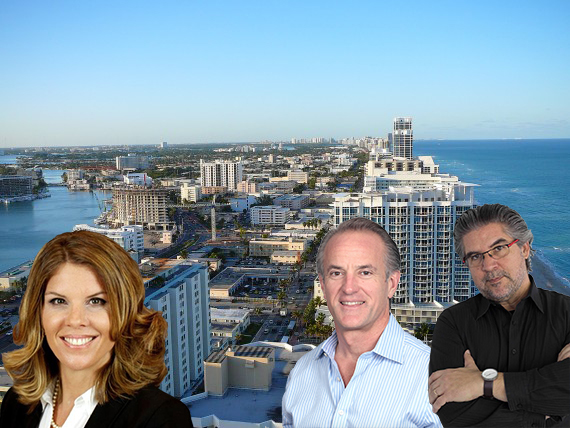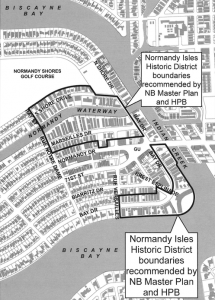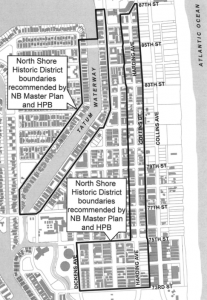Property owners and business advocates used sea-level rise as an argument against designating North Beach neighborhoods historic during a contentious special Miami Beach City Commission meeting on Monday.
Advocates and critics of the proposed historic districts hurled insults and accusations at each other during the four-hour workshop. During the meeting, three people were escorted out of the commission’s chambers. And Miami Beach Commissioner Kristen Rosen Gonzalez was admonished by her colleagues and heckled by property owners after she claimed that as many as 10,000 working-class renters could be potentially “displaced” when their apartments are demolished if the historic districts aren’t enacted, with Commissioner Ricky Arriola insisting her claim was an extreme exaggeration.
Preservationists and local homeowners who attended the meeting want the city to officially designate chunks of North Beach as a historic district, thereby requiring any demolitions or alterations to unique structures built between the 1930s to the 1960s to be judged by the Miami Beach Historic Preservation Board. Many of these areas have already been deemed architecturally significant by the National Registry of Historic Places.
“Miami Beach has an historic brand to protect,” said Parkview Island homeowner Tanya Bhatt, one of many North Beach residents clamoring for historic designation, partly out of fear that non-resident property owners want to replace older low-rise buildings in their neighborhood with larger structures.
But apartment building owners and professionals affiliated with the Miami Beach Chamber of Commerce argued that the historic preservation board doesn’t consistently factor in the prospect of sea-level rise in the next 15 years or the high insurance rates that come with it.
“They believe they can turn the neighborhood into socialized housing,” grumbled Matis Cohen, who owns property throughout North Beach. “We don’t have the protection of homesteaders [primary residents], so our property taxes go up every year. Our insurance has gone up 600 percent in the last two-and-a-half years.”
Brickell-based architect Reinaldo Borges, a critic of historic preservation and a member of the Miami Beach chamber, was in favor of a middle ground that was also proposed by city planners: the creation of conservation districts where older buildings can be demolished and replaced with new structures about five stories in height. Borges contended that older properties will continue to be rehabilitated in North Beach, when it makes financial sense to do so.
“There are limits to what we can do and there are limits to what we can rent,” said Borges, who was escorted out of the Miami Beach Commission Chambers along with North Beach preservation proponent Paul Markowitz after the two argued.
Cohen, however, wants a moratorium on demolitions in North Beach to end, allowing developers to build anywhere from five to 12 stories.
“It’s been 35 years since anything has been built in North Beach,” Cohen told The Real Deal. “All of a sudden [investors express interest in North Beach] and now you want to put restrictions?”
Driving the debate are projected sea-level rise patterns. As noted in City Manager Jimmy Morales’ report to the commission, the Southeast Florida Regional Climate Change Compact predicted that the sea level would rise between 6 to 10 inches by 2030 from the mean sea level measured back in 1992. By 2060, sea-level rise is projected to be at 14 to 34 inches above 1992 levels. By 2100, it could be 31 to 81 inches higher than what it was in 1992.
To address this, the city plans to raise street levels over the next two years by 1.5 feet along Tatum Waterway as well as North Shore Drive and South Shore Drive by Normandy Shores Golf Course, said Public Works Director Eric Carpenter. Sea walls will also need to be raised by up to three feet in those places, Carpenter added. Commissioner John Elizabeth Aleman, who expressed unease about creating new North Beach historic districts, estimated that the cost to each private property owner to raise their sea walls to such a level could be $100,000.
Wayne Pathman, chairman of the Miami Beach Chamber of Commerce and a land-use attorney, claimed that insurance carriers are already gearing up to raise flood insurance rates dramatically. In the future, Pathman added, it will be nearly impossible to obtain a mortgage to purchase a historically designated building that tends to flood 100 days of the year, especially in North Beach, where hotel room rates and monthly rents are far lower than South Beach.
“These are not theoretical [problems]. They’re already happening,” Pathman said. “Miami Beach is ground zero and you will have to deal with these issues.”
To illustrate current flooding conditions, Cohen enlisted a dozen people to hold pictures of flooded streets in North Beach during the meeting. Cohen insisted the depictions are true, but Tatum Waterway residents in favor of preservation screamed that the pictures were hyperbole.
“We still don’t understand why our streets will be the first raised because we don’t flood,” said Paul Mokha, president of the Fairway Park Neighborhood Association. “It floods on 71st Street and Indian Creek, the busiest intersection in North Beach, every time there’s a high tide.”
Added David Golomb, a Parkview Point resident: “I’m … worried that the issue of sea level rise is somehow being used as a red herring to cover up the real issue, which is historic designation.”
Nancy Liebman, a former Miami Beach commissioner and a founding member of the Miami Design Preservation League, said there’s no reason why the city can’t create historic districts in North Beach while addressing climate change. At the very least, the city should extend the moratorium while the concept is examined, Liebman added.
“The minute you take the protection off, we are going to have mayhem,” Liebman said, predicting a rush for demolition permits by property owners.
But commissioner Arriola feared that if sea-level rise isn’t factored in to any future district guidelines, North Beach will become a blighted area. “If we can’t do this right, they will abandon buildings and take a huge financial loss,” he said.
The Miami Beach commission is scheduled to vote on whether or not to continue the historic designation process for North Beach during a special meeting on Friday.


